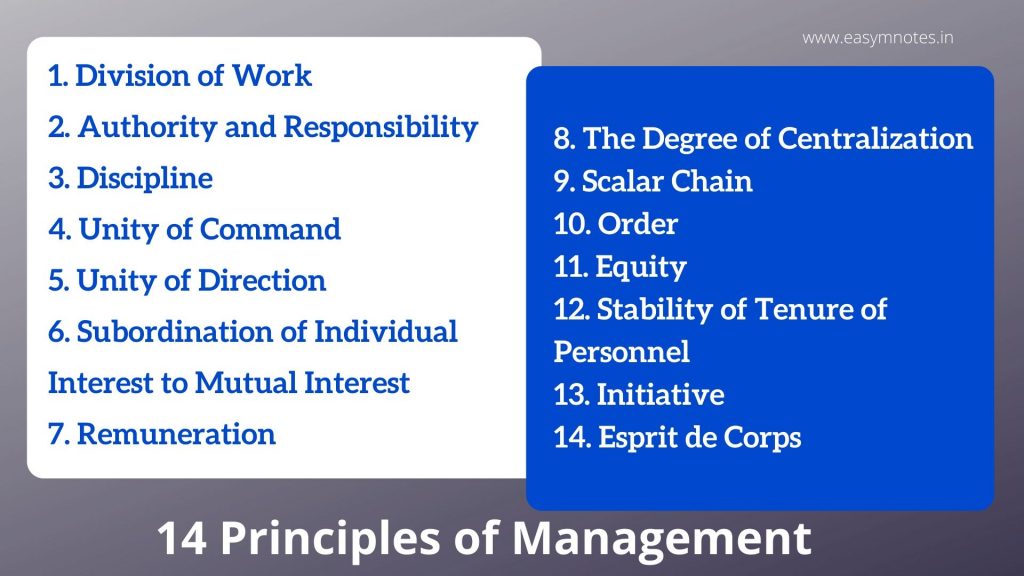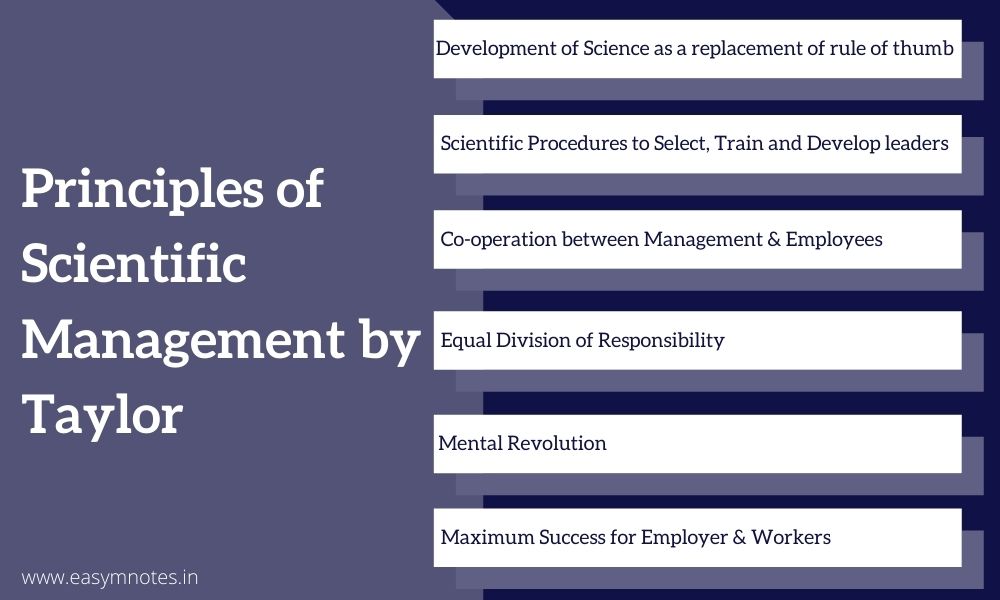A principle, in general, is a fundamental truth that establishes a relationship of cause and effect between two or more variables under given circumstances. Principles serve as a guide to ideas & actions. There are certain management principles serving as statements of fundamental truth based on logic providing guidelines for decision making and actions.

14 Principles of Management
According to Henri Fayol, there are 14 Principles of Management that forms the basis for successful management. These are the outcomes of observations and study of various events managers often experience.
1. Division of Work
This principle of management is applicable to both managerial and technical activities. It states that every employee has a different set of skills that differs from other employee. On the basis of their expertise, employees can be distinguished within the knowledge areas. According to Fayol, expertise promotes efficiency of the employees and boost productivity. Moreover, it also increases speed and precision of the workforce. This management principle of the 14 principles of management is applicable to both technical and managerial activities.
2. Authority and Responsibility
Management is authorized in any organization to give orders to its workforce to get things done. And with this authority comes responsibility. This means that authority and responsibility are the two sides of a coin and should go together. Henri Fayol during his studies realized that authority or power grants managers the right to give orders to the subordinates. The responsibility can be measured from the performance and therefore it is important to make agreements about this.
3. Discipline
This third principle of the 14 management principles speaks about obedience which is often considered as a part of the “major values of a mission and vision in the form of good conduct and respectful interactions”. Discipline or obedience is very essential for any organization to run smoothly.
4. Unity of Command
This principle of management implies that employees are answerable to the manager ordering them. This is an important principle because tasks and responsibilities given to an employee by more than one manager may lead to confusion. This can further lead to conflicts for employees.
5. Unity of Direction
This management principle is all about focus and unity. All activities that are related to each other should be categorized as one unit and carried out by one group as a team. Managers should describe these activities in a plan of action and take responsibility for this plan. In addition, the manager is the one to monitor the progress of the defined activities.

6. Subordination of Individual Interest to Mutual Interest
Every individual in any organization has their own individual interest. However, for smooth functioning of an organization, it is a must that these individual interests be considered as subordinate to the interest (ethics) of the organization. This means that everybody in the organization should focus more on the organizational objectives and not on those of the individual and that this principle is applied to all, from employees to the managers.
7. Remuneration
Motivation and productivity should go together for the smooth running of an organization. This principle argues that remuneration offered to the employees should be sufficient enough to keep them motivated and productive. Henri categorized remuneration under two types: non-monetary (a compliment, more responsibilities, credits) and monetary (compensation, bonus or other financial compensation).
Also Read: How to Motivate Employees without Money?
8. The Degree of Centralization
The amount of power exercised by the central management depends on the size of a company. Centralization refers to the extent of decision making authority at the top management.
9. Scalar Chain
Hierarchy is an important aspect of any organization varying from senior management to the lowest levels. This management principle implies that there should be a clear line in the area of authority at various levels of management.
10. Order
According to this principle, every employee in an organization should have right resources to use so that they can work well in their company. In addition to responsibility of the managers (social order) the work environment must be safe, tidy and clean.
11. Equity
According to Henri Fayol’s Equity principle, workforce must be treated equally and nicely. In addition, employees must be at the right place in the organization to do things correctly. Managers should administer and monitor this process treating their employees impartially and fairly.
12. Stability of Tenure of Personnel
This management principle represents managing and deployment of workers. This should be in equilibrium with the service that is offered by the organization. Management should try to minimize employee turnover and make sure to have the right team in the right place. Major areas such as frequent change of position, sufficient development, etc. must be managed well
13. Initiative
According to Henri Fayol, taking this management principle into account, employees should be allowed to express their own innovative ideas. This is really important as t encourages their interest and involvement creating added value for the organization. Employee ideas and their ideas can acts as a source of strength for the organization.
14. Esprit de Corps
The principle ‘esprit de corps’ stands for striving the participation and unity of its people. It says that it is the responsibility of managers to develop morale in the workplace, at the individual level and even in the area of communication. Esprit de corps adds to the expansion of the culture and creates an atmosphere of mutual trust and understanding.
These 14 management principles of management are useful tools for organization management, planning, forecasting, process management, decision-making, coordination and control.
Download the PDF of Principles Of Management By Fayol here.

